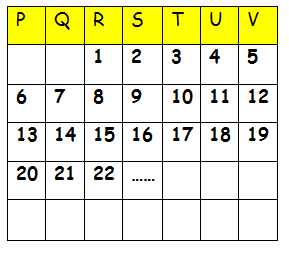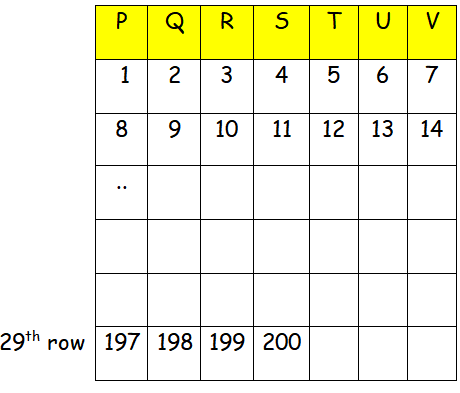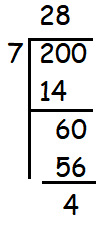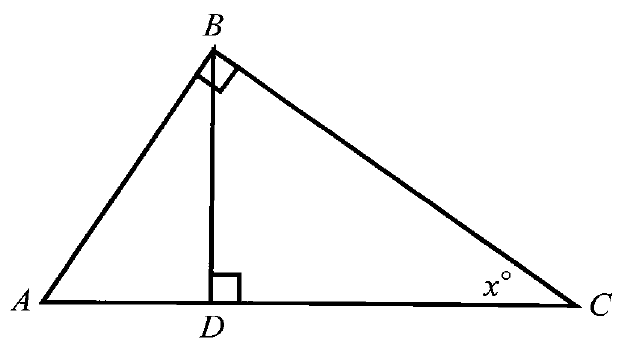SHSAT MATH PRACTICE
Question 1 :
If 3x + 2y = 19 and 2x + 3y = 91, what is the value of x + y ?
(A) 8 (B) 9 (C) 21 (D) 22 (E) 72
Solution :
In order to solve these equations, we may use elimination method.
3x + 2y = 19 -------(1)
2x + 3y = 91 -------(2)
(1) ⋅ 3 ==> 9x + 6y = 57
(1) ⋅ 2 ==> 4x + 6y = 182
(-) (-) (-)
------------------
5x = -125
x = -125/5 = -25
By applying x = -25 in (1), we get
3(-25) + 2y = 19
-75 + 2y = 19
2y = 19 + 75
2y = 94
y = 94/2 = 47
x + y = -25 + 47 = 22
Hence the value of x + y is 22.
Question 2 :
Kenny buys candy bars at 9 for $1 and sells them at 3 for $1. How many candy bars must he sell in order to make a profit of exactly $10.
(A) 27 (B) 30 (C) 45 (D) 60 (E) 90
Solution :
Let x be the number of candies that he has to sell to make the profit of $10.
Cost price of 9 candy bars = $1
Cost price of 1 candy = 1/9
Cost price of x candy bars = x/9
Selling price of 3 candy bars = $1
Selling price of 1 candy = 1/3
Selling price of x candy bars = x/3
Profit = Selling price - Cost price
10 = (x/3) - (x/9)
10 = (3x - x)/9
90 = 2x
x = 45
Hence he has to sell 45 candies to make the profit of $10.
Question 3 :
Juan travels at the rate of 30 miles per hour for 4 hours. He then returns over the same route in 3 hours. What was his average rate for the return trip, in mile per hour ?
(A) 22 1/2 (B) 34 2/7 (C) 35 (D) 36 (E) 40
Solution :
Speed = 30 miles per hour
Time taken for travelling = 4 hours
Time = Distance / speed
4 = Distance/30
Distance = 30(4) = 120 miles
Now, we have to find the speed taken by him to cover the the same distance that is 120 miles in 3 hours.
3 = 120/Speed
Average speed = 120/3 = 40 miles per hour
Question 4 :
The value of 35 + 35 + 35 is
(A) 36 (B) 315 (C) 95 (D) 9125 (E) 45
Solution :
35 + 35 + 35 = 3 (35)
= 3(5 + 1)
= 36
Hence the answer is 36.
Question 5 :
Lindsay has P dollars and mark has $9 less than Lindsay. If mark receives an additional $11, how many dollars will mark now have, in terms of P?
(A) P - 20 (B) 20 - P (C) P + 2 (D) 2 - P (E) P + 11
Solution :
Number of dollars that Lindsay has = P
Number of dollars mark has = P - 9
Number of dollars received by mark additionally = $11
= P - 9 + 11
= P + 2
Hence the number of dollars received by mark is P + 2
Question 6 :
R = 2 ⋅ 3 ⋅ 3 ⋅ 5 ⋅ 7 ⋅ 11 ⋅ 11 and S = 3 ⋅ 7 ⋅ 13 ⋅ 17, what is the greatest common factor of R and S ?
(A) 2 ⋅ 3 ⋅ 3 ⋅ 3 ⋅ 5 ⋅ 7 ⋅ 7 ⋅ 11 ⋅ 11 ⋅ 13 ⋅ 17
(B) 2 ⋅ 3 ⋅ 3 ⋅ 5 ⋅ 7 ⋅ 11 ⋅ 13 ⋅ 17
(C) 3 ⋅ 7 (D) 3 ⋅ 3 ⋅ 7 ⋅ 7 (D) 3 ⋅ 3 ⋅ 3 ⋅ 7 ⋅ 7
Solution :
Greatest common factor = 3 ⋅ 7
Question 7 :
The counting numbers are placed in order in the chart, as shown. Assuming the pattern continues, in which column will the 200 appear ?

(A) Q (B) S (C) T (D) U (E) V
Solution :
If we write 1 from the first column, we get multiples of 7 in vth column.
First let us find how many 7's are in 200.
 |
 |
7 (28) = 196
From the picture given above, we know that 200 will be in the position of Sth column. Since we started 1 from the column R, we have to move 200 two columns towards the right.
So, 200 will be in Uth column.
Question 8 :
The equation 2(3x + 6) = 3(2x + 4) is satisfied by
(A) No value of x (B) Only negative values of x
(C) Only x = 0
(D) only positive values of x (E) all values of x
Solution :
2(3x + 6) = 3(2x + 4)
6x + 12 = 6x + 12
All values of x is the answer.
Question 9 :
Wai ling averaged 84 on her first three exams and 82 on her next 2 exams. What grade must she obtain on her sixth test in order to average 85 for all six exams.
(A) 96 (B) 94 (C) 90 (D) 89 (E) 86
Solution :
By writing the marks scored in six exams
Let "x" be the required mark in sixth subject.
84, 84, 84, 82, 82, x
Average mark = 85
[3(84) + 2(82) + x]/6 = 85
252 + 164 + x = 85(6)
416 + x = 510
x = 510 - 416
x = 94
Hence Wai has to score 94 mark in 6th exam.
Question 10 :
How many prime numbers between 8 and 60 leave a remainder of 2 when divided by 6 ?
(A) 0 (B) 1 (C) 4 (D) 6 (E) 7
Solution :
Write the multiples of 6 lies between 8 and 60.
12, 18, 24, 30, 36, 42, 48, 54, 60
If a number is a multiple of 6, then it should be a even number. 2 is the only even prime number.
Hence we will not have a prime number which is divisible by 6 and leaves the remainder 2.
So, the answer is 0.
More Practice Test Papers
SHSAT math practice test - Paper 1
SHSAT math practice test - Paper 2
SHSAT math practice test - Paper 3
SHSAT math practice test - Paper 4
SHSAT math practice test - Paper 5
SHSAT math practice test - Paper 6
SHSAT math practice test - Paper 7
SHSAT math practice test - Paper 8
SHSAT math practice test - Paper 9
SHSAT math practice test - Paper 10
SHSAT math practice test - Paper 11
Kindly mail your feedback to v4formath@gmail.com
We always appreciate your feedback.
©All rights reserved. onlinemath4all.com
Recent Articles
-
Digital SAT Math Problems and Solutions (Part - 144)
Apr 14, 25 07:27 PM
Digital SAT Math Problems and Solutions (Part - 144) -
Quadratic Equation Problems with Solutions (Part - 1)
Apr 14, 25 11:33 AM
Quadratic Equation Problems with Solutions (Part - 1) -
Quadratic Equation Problems with Solutions (Part - 2)
Apr 14, 25 11:22 AM
Quadratic Equation Problems with Solutions (Part - 2)
